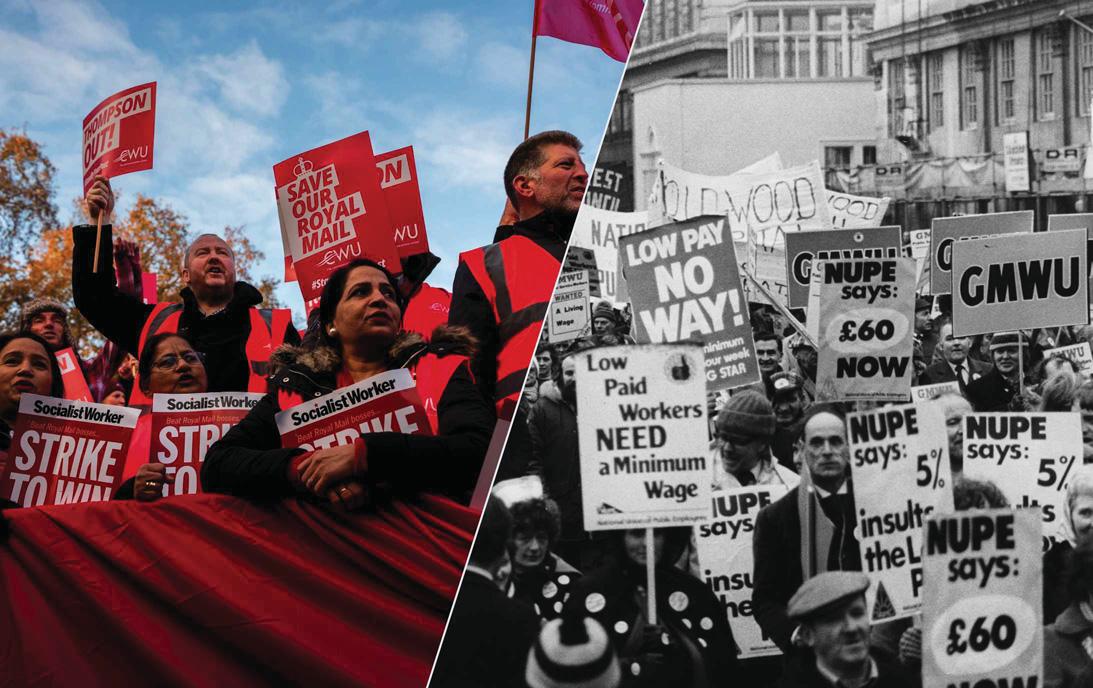Try GOLD - Free
Britain's century of strike action
BBC History UK
|February 2023
Recent months have seen thousands of workers - including nurses, railway employees and postal staff go on strike around the United Kingdom. RICHARD TOYE explores the nation's history of industrial action, and the extent to which it has been driven by political ideology or practical concerns


Radical action? Members of the National Union of Seamen at a rally in Liverpool calling for shorter hours and higher wages, May 1966. Prime minister Harold Wilson's bid to link the strike to communism sparked ridicule
The widespread disruption caused by the recent series of strikes in the UK-in which even driving test examiners have laid down their iPads has led to comparisons with the 1978-79 Winter of Discontent, when large-scale action across a range of industries contributed to the fall of the Labour government led by James Callaghan. The current prime minister, Rishi Sunak, was not yet born in 1979, and memories of its events are now fading. Nevertheless, they retain a powerful hold on the political imagination, and have eclipsed other periods of disruption which were of equivalent historical significance.
With important exceptions, the British trades union movement has focused on improving pay and conditions rather than on overtly political objectives. By the turn of the 20th century, after decades of struggle, the union movement had become well established, with more than 2 million members - including many unskilled and semi-skilled workers. Moreover, the Labour Representation Committee was founded in 1900 with the purpose of providing "a distinct Labour group in parliament" in order to promote "legislation in the direct interests of labour". After a slow start, 29 Labour MPs were elected at the general election of 1906. They helped secure a Trades Disputes Act, restoring union rights that had been removed by the courts. Here was evidence that legal change could be achieved incrementally in the House of Commons; on the ground, unions could concentrate on bettering the positions of their own members via collective bargaining.
This story is from the February 2023 edition of BBC History UK.
Subscribe to Magzter GOLD to access thousands of curated premium stories, and 10,000+ magazines and newspapers.
Already a subscriber? Sign In
MORE STORIES FROM BBC History UK

BBC History UK
Hymn to life
Scripted by Alan Bennett and directed by Nicholas Hytner - a collaboration that produced The Madness of King George and The History Boys – The Choral is set in 1916.
1 min
December 2025

BBC History UK
Helen Keller
It was when I was eight or nine years old, growing up in Canada, and I borrowed a book about her from my local library.
2 mins
December 2025

BBC History UK
Spain's miracle
The nation's transition from dictatorship to democracy in the late 1970s surely counts as one of modern Europe's most remarkable stories. On the 50th anniversary of General Franco's death, Paul Preston explores how pluralism arose from the ashes of tyranny
8 mins
December 2025

BBC History UK
Just how many Bayeux Tapestries were there?
As a new theory, put forward by Professor John Blair, questions whether the embroidery was unique, David Musgrove asks historians whether there could have been more than one 'Bayeux Tapestry'
7 mins
December 2025

BBC History UK
In service of a dictator
HARRIET ALDRICH admires a thoughtful exploration of why ordinary Ugandans helped keep a monstrous leader in power despite his regime's horrific violence
2 mins
December 2025

BBC History UK
The Book of Kells is a masterwork of medieval calligraphy and painting
THE BOOK OF KELLS, ONE OF THE GREATEST pieces of medieval art, is today displayed in the library of Trinity College Dublin.
3 mins
December 2025

BBC History UK
Passing interest
In his new book, Roger Luckhurst sets about the monumental task of chronicling the evolution of burial practices. In doing so, he does a wonderful job of exploring millennia of deathly debate, including the cultural meanings behind particular approaches.
1 mins
December 2025

BBC History UK
Is the advance of AI good or bad for history?
As artificial intelligence penetrates almost every aspect of our lives, six historians debate whether the opportunities it offers to the discipline outweigh the threats
8 mins
December 2025

BBC History UK
Beyond the mirage
All serious scholarship on ancient Sparta has to be conducted within the penumbra of the 'mirage Spartiate', a French term coined in 1933 to describe the problem posed by idealised accounts of Sparta.
1 mins
December 2025

BBC History UK
He came, he saw... he crucified pirates
Ancient accounts of Julius Caesar's early life depict an all-action hero who outwitted tyrants and terrorised bandits. But can they be trusted? David S Potter investigates
10 mins
December 2025
Translate
Change font size

